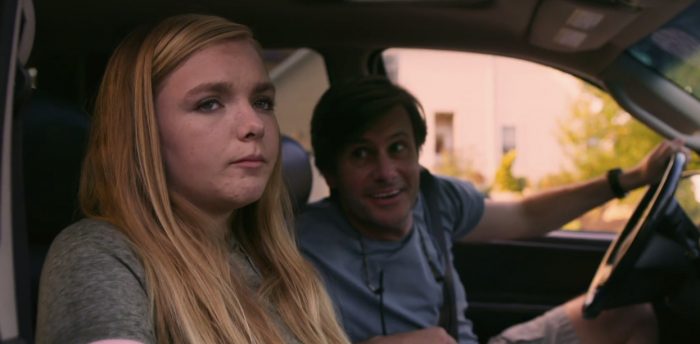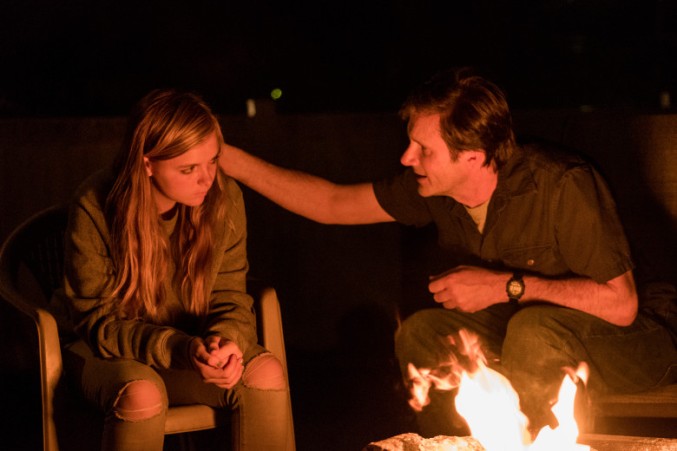Eighth Grade is the writing and directing debut of comedian Bo Burnham, starring Elsie Fisher as a girl finishing her last week of middle school. There is perhaps nobody on the planet better equipped to tell the story of modern-day digital youth culture than Burnham, who grew up in the social media era and made his name by making YouTube videos. His stand-up work often explores themes of performance art and mass consumerism, with his latest Netflix special (Make Happy) serving as an apparent goodbye to the comedy scene and reflecting a desire to move away from the front of the camera. How does his first film represent the culmination of all he’s learned thus far in his already-long career?

I don’t want to gush too much, but I have long believed that Bo Burnham is a creative genius. I’ve followed his work since his early stand-up days, and his talent, poise and awareness of the world far exceeds his years. I wasn’t surprised to see him create such a critically-acclaimed work in Eighth Grade so young, and frankly I’m glad this will introduce him to a more mainstream audience than the annals of ruthless online fandom. His coming-of-age tale, told from the perspective of a teenage girl, is a beautiful story of self-confidence updated for the modern age.
I love the inherent irony of the setup: an awkward girl with no friends publishing self-help videos on YouTube. The beauty of depicting the modern age of self-promotion is that it’s easier for our characters to reveal their inner selves in a public manner. Previous films about teenagers would use something like a diary to represent these inner thoughts, and a video blog is not only a better visual medium to relate this, but a fascinating reflection on the filters we put in place before sharing ourselves with the world. We don’t need to hear Kayla talk about how awkward she is in public; we can see that for ourselves, and her public projection of confidence gives us an idea of how she feels about it. It’s like her self-help videos are actually for herself, even if she doesn’t realize it.

The minutia of the film is brilliant. Burnham includes just enough relevant modern references to place this film in time (Rick and Morty memes, dabbing, jabs at Facebook) without overloading us with allusion. As a comedian, he knows how to build tension and humor within a scene incredibly well, making us squirm or laugh out loud on command. Clever editing and shot structure help to put us in Kayla’s shoes, so we feel every cringe, every moment of terror or elation, every flutter of excitement. Characters speak like real people; dialogue feels natural and unforced. The only scene that didn’t really do it for me is a later scene where Kayla’s dad gives her a heartfelt pep talk. I understand its narrative function, and it will be a tear-jerker for some, but it was the first time I really felt the writer inserting himself into the story. It feels “written,” if that makes sense, when placed in the context of the rest of the film, which flows naturally and doesn’t feel like artificial dialogue.
In broader strokes, the film does have a few plot issues. There isn’t much of an internal structure to the film, no major stakes or goals for our protagonist. Kayla definitely has a character arc, but I would’ve liked to see something more concrete driving her forward moment to moment. Maybe a big speech she has to prepare for, or something along those lines that the plot can build up towards. As such, the film can feel rudderless at times. That isn’t to say that it is ever dull, because every scene is fascinating and humorous, but still, it didn’t really leave me with anything. There is a semblance of structure in following Kayla’s blog, as her mindset on the world does change over time, but it’s loose at best. Several storylines are dropped without proper resolution, and it’s especially felt when there aren’t many storylines to begin with.

The film may not approach some of the more important aspects of growing up, instead blowing up several less-important issues to a grandiose scale, but that’s part of the film’s charm. The things that matter to an eighth-grade girl aren’t always world-shattering problems; she doesn’t flinch during a school shooting training exercise, for instance, but the mere thought of talking to her crush gives her crippling anxiety. There are some heavier moments in the film, but for the most part it’s light and low-stakes. Burnham uses Kayla’s life as a microcosm, telling universal truths on a smaller scale to highlight just how important everything seems as a teen, even if it isn’t. This is reinforced by Kayla’s interaction with high school students later in the film; they reflect on the great divide between them in the wake of social media, while also reassuring Kayla that life DOES get better from here on out.
Elsie Fisher’s performance is absolutely incredible; she carries the entire emotional weight of the film on her shoulders, and she is perfect down to the smallest detail. She’s going to make waves this awards season, and I would not be surprised in the slightest to see her earn an Oscar nomination. The supporting cast is solid as well; Burnham does a great job coaching the kid actors to encapsulate the awkwardness and angst of youth. Josh Hamilton is a great underrated character actor as well; as Kayla’s father, he acts as a stand-in for the older audience, trying to pry into the complicated mind of a child in today’s digital age. Even the adults are solid as the more aloof forces in these kids’ lives, trying everything from dabbing and terms like “lit” in a vain attempt to relate to them. There isn’t a weak link anywhere, and you can chalk that up to great casting and stage direction from Burnham.

Conclusion
Eighth Grade is one of the best films of the year. It isn’t perfect, and it isn’t necessarily consequential, but it smartly tackles some of the modern-day challenges of growing up. Whatever problems I might have with it pale in comparison to the beautiful experience of watching the film. In that respect it’s almost the exact opposite of my thoughts on Sorry to Bother You: rather than a great concept poorly executed, it’s a largely-generic concept perfectly executed. It flawlessly captures all the tiny moments that make up the adolescent experience, and with any luck, it might help the older generation understand some of the unique pressures on today’s generation and the reasons why social media has grown to such a juggernaut among that demographic. I hope this is only the beginning for Bo Burnham as a filmmaker and would love to see him tackle meatier subject matter in the future.
VERDICT: A-
-Austin Daniel
All image rights belong to A24.
15 thoughts on ““Eighth Grade” Film Review (Spoiler Free!)”